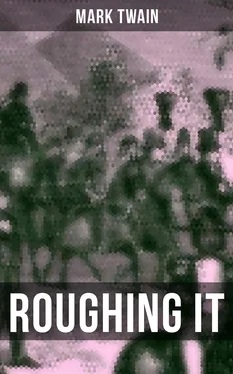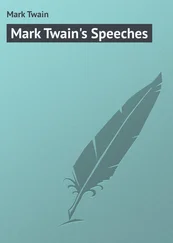After breakfast, at some station whose name I have forgotten, we three climbed up on the seat behind the driver, and let the conductor have our bed for a nap. And by and by, when the sun made me drowsy, I lay down on my face on top of the coach, grasping the slender iron railing, and slept for an hour or more. That will give one an appreciable idea of those matchless roads. Instinct will make a sleeping man grip a fast hold of the railing when the stage jolts, but when it only swings and sways, no grip is necessary. Overland drivers and conductors used to sit in their places and sleep thirty or forty minutes at a time, on good roads, while spinning along at the rate of eight or ten miles an hour. I saw them do it, often. There was no danger about it; a sleeping man will seize the irons in time when the coach jolts. These men were hard worked, and it was not possible for them to stay awake all the time.
By and by we passed through Marysville, and over the Big Blue and Little Sandy; thence about a mile, and entered Nebraska. About a mile further on, we came to the Big Sandy — one hundred and eighty miles from St. Joseph.
As the sun was going down, we saw the first specimen of an animal known familiarly over two thousand miles of mountain and desert — from Kansas clear to the Pacific Ocean — as the “jackass rabbit.” He is well named. He is just like any other rabbit, except that he is from one third to twice as large, has longer legs in proportion to his size, and has the most preposterous ears that ever were mounted on any creature but a jackass.
When he is sitting quiet, thinking about his sins, or is absentminded or unapprehensive of danger, his majestic ears project above him conspicuously; but the breaking of a twig will scare him nearly to death, and then he tilts his ears back gently and starts for home. All you can see, then, for the next minute, is his long gray form stretched out straight and “streaking it” through the low sagebrush, head erect, eyes right, and ears just canted a little to the rear, but showing you where the animal is, all the time, the same as if he carried a jib. Now and then he makes a marvelous spring with his long legs, high over the stunted sagebrush, and scores a leap that would make a horse envious. Presently he comes down to a long, graceful “lope,” and shortly he mysteriously disappears. He has crouched behind a sage-bush, and will sit there and listen and tremble until you get within six feet of him, when he will get under way again. But one must shoot at this creature once, if he wishes to see him throw his heart into his heels, and do the best he knows how. He is frightened clear through, now, and he lays his long ears down on his back, straightens himself out like a yardstick every spring he makes, and scatters miles behind him with an easy indifference that is enchanting.
Our party made this specimen “hump himself,” as the conductor said. The secretary started him with a shot from the Colt; I commenced spitting at him with my weapon; and all in the same instant the old “Allen’s” whole broadside let go with a rattling crash, and it is not putting it too strong to say that the rabbit was frantic! He dropped his ears, set up his tail, and left for San Francisco at a speed which can only be described as a flash and a vanish! Long after he was out of sight we could hear him whiz.
I do not remember where we first came across “sagebrush,” but as I have been speaking of it I may as well describe it.
This is easily done, for if the reader can imagine a gnarled and venerable live oak-tree reduced to a little shrub two feet-high, with its rough bark, its foliage, its twisted boughs, all complete, he can picture the “sagebrush” exactly. Often, on lazy afternoons in the mountains, I have lain on the ground with my face under a sage-bush, and entertained myself with fancying that the gnats among its foliage were liliputian birds, and that the ants marching and countermarching about its base were liliputian flocks and herds, and myself some vast loafer from Brobdignag waiting to catch a little citizen and eat him.
It is an imposing monarch of the forest in exquisite miniature, is the “sagebrush.” Its foliage is a grayish green, and gives that tint to desert and mountain. It smells like our domestic sage, and “sage-tea” made from it taste like the sage-tea which all boys are so well acquainted with. The sagebrush is a singularly hardy plant, and grows right in the midst of deep sand, and among barren rocks, where nothing else in the vegetable world would try to grow, except “bunch-grass.” — [“Bunch-grass” grows on the bleak mountainsides of Nevada and neighboring territories, and offers excellent feed for stock, even in the dead of winter, wherever the snow is blown aside and exposes it; notwithstanding its unpromising home, bunch-grass is a better and more nutritious diet for cattle and horses than almost any other hay or grass that is known — so stockmen say.] — The sage-bushes grow from three to six or seven feet apart, all over the mountains and deserts of the Far West, clear to the borders of California. There is not a tree of any kind in the deserts, for hundreds of miles — there is no vegetation at all in a regular desert, except the sagebrush and its cousin the “greasewood,” which is so much like the sagebrush that the difference amounts to little. Campfires and hot suppers in the deserts would be impossible but for the friendly sagebrush. Its trunk is as large as a boy’s wrist (and from that up to a man’s arm), and its crooked branches are half as large as its trunk — all good, sound, hard wood, very like oak.
When a party camps, the first thing to be done is to cut sagebrush; and in a few minutes there is an opulent pile of it ready for use. A hole a foot wide, two feet deep, and two feet long, is dug, and sagebrush chopped up and burned in it till it is full to the brim with glowing coals. Then the cooking begins, and there is no smoke, and consequently no swearing. Such a fire will keep all night, with very little replenishing; and it makes a very sociable campfire, and one around which the most impossible reminiscences sound plausible, instructive, and profoundly entertaining.
Sagebrush is very fair fuel, but as a vegetable it is a distinguished failure. Nothing can abide the taste of it but the jackass and his illegitimate child the mule. But their testimony to its nutritiousness is worth nothing, for they will eat pine knots, or anthracite coal, or brass filings, or lead pipe, or old bottles, or anything that comes handy, and then go off looking as grateful as if they had had oysters for dinner. Mules and donkeys and camels have appetites that anything will relieve temporarily, but nothing satisfy.
In Syria, once, at the headwaters of the Jordan, a camel took charge of my overcoat while the tents were being pitched, and examined it with a critical eye, all over, with as much interest as if he had an idea of getting one made like it; and then, after he was done figuring on it as an article of apparel, he began to contemplate it as an article of diet. He put his foot on it, and lifted one of the sleeves out with his teeth, and chewed and chewed at it, gradually taking it in, and all the while opening and closing his eyes in a kind of religious ecstasy, as if he had never tasted anything as good as an overcoat before, in his life. Then he smacked his lips once or twice, and reached after the other sleeve. Next he tried the velvet collar, and smiled a smile of such contentment that it was plain to see that he regarded that as the daintiest thing about an overcoat. The tails went next, along with some percussion caps and cough candy, and some fig-paste from Constantinople.
Читать дальше












